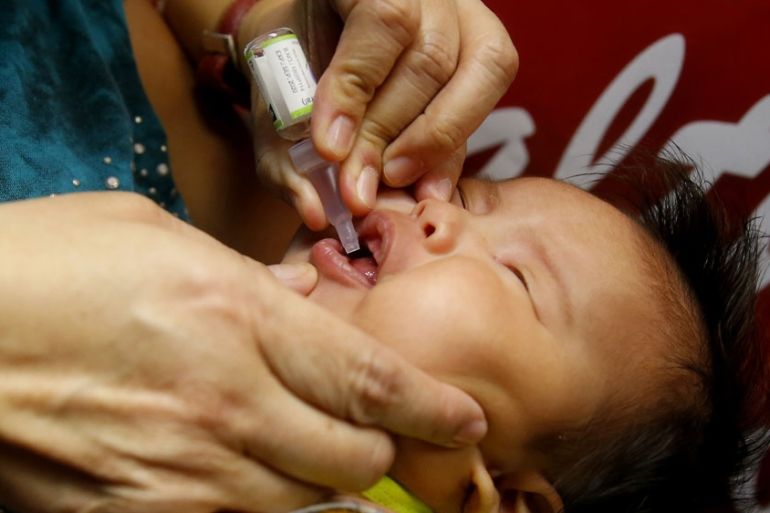Philippines launches polio vaccine campaign after new outbreak
Two cases have been confirmed in children and traces of the virus were found in sewage in two regions.

The Philippines has launched a polio immunisation campaign and declared an outbreak in the country after confirming two cases in children and finding the virus in sewage in two provinces, the country’s Department of Health said.
The confirmed cases ended a 19-year period in which the country, home to about 105 million, was considered polio-free, according to the World Health Organization (WHO).
Keep reading
list of 4 itemsWoman, seeking loan, wheels corpse into Brazilian bank
UK set to ban tobacco sales for a ‘smoke-free’ generation. Will it work?
Poland lawmakers take steps towards liberalising abortion laws
It was officially declared free of the virus, which tends to affect children under five and can cause irreversible paralysis within hours, in 2000.
The outbreak comes as the Philippines grapples with separate epidemics of measles and dengue fever that have killed more than 1,000 people, mostly children, since January.
Health officials say fears over a trial dengue fever vaccine, which health workers began administering in 2016 and then halted the following year, have caused vaccination rates for all types of viruses to plummet in recent years.
In the capital, polio vaccinations dropped from just over 77 percent of the target numbers in 2016 to below 24 percent in June, making the metropolis of 13 million a high-risk area for the re-emergence of polio, according to the Department of Health.
No known cure
The most recent polio cases were confirmed in a five-year-old boy in Laguna, a province southeast of Manila, and a three-year-old girl in southern Lanao del Sur province, according to Department of Health. The cases were about 1,400 km (870 miles) apart.
The polio virus was also detected in Manila’s sewage and in the waterways of the Davao region, which is on the Philippines’ southernmost island.
Oyun Dendevnorov, the Philippines representative for the United Nation’s Children’s Fund (UNICEF), called the re-emergence “deeply disconcerting”.
Nineteen years after the country was declared polio-free, Polio is once again re-emerging in the Philippines.
I strongly urge parents, health workers and local governments to fully participate in the synchronized polio vaccination, and practice good personal hygiene. pic.twitter.com/r9IA6Y51Kg
— Francisco T. Duque III (@SecDuque) September 19, 2019
When contracted, there is no cure and transmission can only be prevented through immunisations.
“As long as one single child remains infected, children across the country and even beyond are at risk of contracting polio,” she said in a statement released by the WHO on Thursday.
A global effort to eradicate polio has slashed infections from more than 350,000 cases in 1988 to just 33 last year, according to WHO data. Only Afghanistan, Nigeria and Pakistan have failed to stop transmission.
Poliovirus has reemerged in the Philippines nearly two decades of being #polio-free. UNICEF and @WHOPhilippines are supporting @DOHgov's outbreak response. READ: https://t.co/7x5RZBJJKt #VaccinesWork #EndPolio
— UNICEF Philippines (@unicefphils) September 19, 2019
Vaccination Scare
In 2016, the Philippines became the first nation to use Dengvaxia, the world’s first dengue vaccine, in a country trial programme involving hundreds of thousands of schoolchildren
More than 830,000 children received the Dengvaxia vaccine under the campaign.
The government halted the immunisation drive in 2017 after French maker Sanofi said a study showed the vaccine may increase the risk of severe dengue infections.
However, Sanofi officials maintained the Dengvaxia vaccine was safe and would reduce dengue infections if the vaccination drive continued.
|
|
Nevertheless, the disclosure sparked a nationwide panic, with some parents alleging the vaccine killed their children, though a government-commissioned investigation found no conclusive proof that it did.
The records of 119 dead children are being examined in a continuing inquiry to determine if Dengvaxia was to blame, a panel of medical experts said in March.
Immunisation coverage in the Philippines is currently at 70 percent, below the recommended rate of 95 percent, according to Rolando Enrique Domingo, an undersecretary of the country’s Department of Health.
In 2018, 12 out of the 17 regions in the country were identified as high-risk areas for polio reemergence, according to the Department of Health.
“The polio vaccinations happen all year round, but our coverage dropped for the past five years,” Domingo told Reuters news agency.
“We’ve learned our lesson. It is time to move on and really start vaccinating all kids and make sure we sustain this every year,” he said.